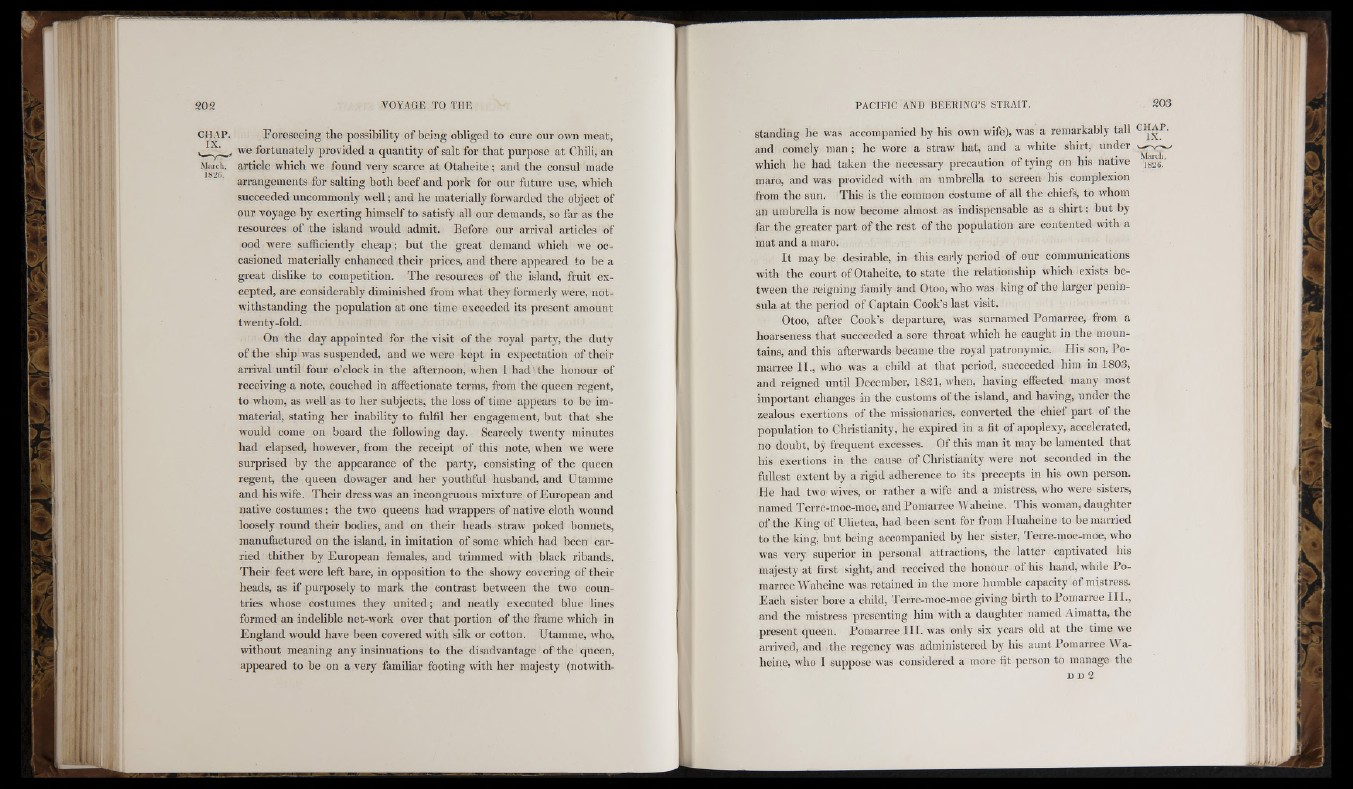
Foreseeing the possibility of being obliged to cure our own meat,
, we fortunately provided a quantity of salt for that purpose at Chili, an
article which we found very scarce at Otaheite; and the consul made
arrangements for salting both beef and pork for our future use, which
succeeded uncommonly w'ell; and he materially forwarded the object of
our voyage by exerting himself to satisfy all our demands, so far as the
resources of the island would admit. Before our arrival articles of
ood were sufficiently cheap; but the great demand whicli we occasioned
materially enhanced their prices, and there appeared to be a
great dislike to competition. The resources of the island, fruit excepted,
are considerably diminished from what they formerly W'ere, notwithstanding
the population at one time exceeded its present amount
twenty-fold.
On the day appointed for the visit of the royal party, the duty
of the ship was suspended, and we were kept in expectation of their
arrival until four o’clock in the afternoon, when 1 had the honour of
receiving a note, couched in affectionate terms, from the queen regent,
to whom, as well as to her subjects, the loss of time appears to be immaterial,
stating her inability to fulfil her engagement, but that she
would come on board the fallowing day. Scarcely twenty minutes
had elapsed, however, from the receipt of this note, when we were
surprised by the appearance of the party, consisting of the queen
regent, the queen dowager and her youthful husband, and Utamiue
and his wife. Their dress was an incongruous mixture of European and
native costumes; the two queens had wrappers of native cloth W'ound
loosely round their bodies, and on their heads straw poked bonnets,
manufactured on the island, in imitation of some which had been carried
thither by European females, and trimmed with black ribands.
Their feet were left bare, in opposition to the showy covering of their
heads, as if purposely to mark the contrast between the two countries
whose costumes they united; and neatly executed blue lines
formed an indelible net-work over that portion of the frame which in
England would have been covered with silk or cotton. Utamme, who,
without meaning any insinuations to the disadvantage of the queen,
appeared to be on a very familiar footing with her majesty (notwithMarch,
1826.
standing he was accompanied by his owm wife), was a remarkably tall
and comely man ; he wore a straw hat, and a white shirt, under
which ho had taken the necessary precaution of tying on his native
maro, and was provided with an umbrella to screen his complexion
from the sun. This is the common costume of all the chiefs, to whom
an iimbrella is now become almost as indispensable as a shirt; but by
far the greater part of the rest of the population are contented with a
mat and a maro.
It may be desirable, in this early period of our communications
with the court of Otaheite, to state the relationship which exists between
the reigning family and Otoo, who was king of the larger peninsula
at the period of Captain Cook’s last visit.
Otoo, after Cook’s departure, was surnamed Pomarree, from a
hoarseness that succeeded a sore throat which he caught in the mountains,
and this afterwards became tlie royal patronymic. His son, Pomarree
II., who was a child at that period, succeeded him in 180.3,
and reigned until December, 1821, when, having effected many most
important changes iu the customs of the island, and having, under the
zealous exertions of the missionaries, converted the chief part of the
population to Christianity, he expired in a fit of apoplexy, accelerated,
no doubt, by frequent excesses. Of this man it may be lamented that
his exertions in the cause of Christianity were not seconded in the
fullest extent by a rigid adherence to its precepts in his own person.
He had two wives, or rather a wife and a mistress, who were sisters,
named Terre-moe-raoe, and Pomarree Waheine. This woman, daughter
of the King of Ulietea, had been sent for from Iluaheine to be married
to the king, hut being accompanied by her sister, Terre-moe-moe, who
was very superior iu personal attractions, the latter captivated his
majesty at first siglit, and received the liouour of his hand, w hile Pomarree
Waheine wars retained iu the more liumble capacity of mistress.
Each sister bore a child, Terre-moe-moe giving birth to Pomarree III.,
and the mistress presenting liim with a daughter named Aimatta, the
present queen. Pomarree III. was only six years old at the time we
arrived, and the regency was administered by his aunt Pomarree Wa-
lieine, wlio 1 suppose was considered a more fit person to manage the
D D 2